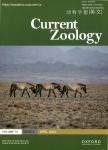The impact of personality on the success of prospecting behavior in changing landscapes
The impact of personality on the success of prospecting behavior in changing landscapes作者机构:Graduate Program in Ecology and Evolution Department of Ecology Evolution and Natural Resources Rutgers University 14College Farm Rd. New Brunswick NJ 08901 USA
出 版 物:《Current Zoology》 (动物学报(英文版))
年 卷 期:2015年第61卷第3期
页 面:557-568页
核心收录:
学科分类:081803[工学-地质工程] 08[工学] 0818[工学-地质资源与地质工程] 0834[工学-风景园林学(可授工学、农学学位)]
基 金:Renewable and Sustainable Fuels IGERT program, Rutgers University NSF Graduate Program in Ecology, Evolution and Natural Resources, Rutgers University
主 题:Prospecting Tradeoff Movement Decision theory Personality Behavior
摘 要:Personality can play a large role in dispersal decisions, influencing how each individual estimates and values ex- pected costs versus benefits of ventnring out to explore the unknown. We contrast the impact of persistence on fitness using deci- sion theory models to examine the relative success of prospecting movement (which is a widespread behavior used by animals to explore available breeding habitat before determining where to settle) in different landscapes among individuals with different personalities. While evaluating trends in the costs and benefits of movement we provide a quantifiable measure of the impacts of relative tenacity in prospecting behavior on fitness gains/losses. Our model results predict that, regardless of landscape composi- tion, individuals with greater tenacity in prospecting strategy have reduced fitness gains relative to individuals who are more willing to both initiate novel strategies, but then also abandon the new strategy rapidly if initial search does not seem fruitful. We show that fitness gains from choosing an appropriate prospecting strategy (i.e. abandoning poor habitat or staying in rich habitat) can be very high, indicating a potentially large influence from personality on fitness. Importantly, the model predicts that relative fitness gains are highly dependent on the availability of high quality habitat in the landscape, even if the difference under varying fitness outcomes between poor and rich habitat was substantial



